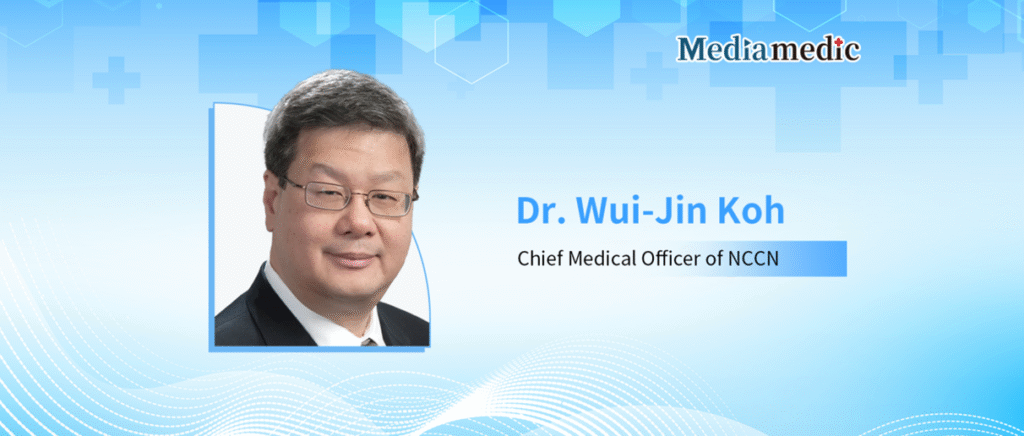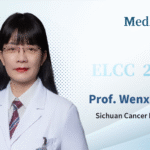
As the 2025 Annual Meeting of the National Comprehensive Cancer Network (NCCN) concluded, Oncology Frontier exclusively interviewed Dr. Wui-Jin Koh, Chief Medical Officer of NCCN, to decode the future trends in cancer care. From the application prospects of AI-assisted medical decision-making to the inclusive practice of decentralized clinical trials, from the systemic challenges of combating healthcare professionals' burnout to the ecological reconstruction of cancer patient care systems, Dr. Wui-Jin Koh’s insights not only reveal NCCN’s future directions but also provide valuable references for the global medical community.Oncology Frontier: The NCCN 2025 Annual Meeting emphasized the role of AI in oncology care. How does NCCN strike a balance between robust evidence-based medicine and emerging AI tools? Will the 2025 guideline updates incorporate validated AI models?
Dr. Wui-Jin Koh: Thank you for having me on this discussion. So, we understand the emerging role of AI in many parts of society, including medicine and oncology. I think we need to be a little bit careful when we use AI. To say broadly, what exactly that facet of AI, we’re continuing to monitor the emergence of AI and its potential role in decision support.
So at this point, NCCN, what we’re very interested in, it is not incorporating AI into how to create the guidelines, for example. We still believe that is not yet there, but we do recognize the role of AI in certain elements of the guidelines. For example, we know that AI is used in helping do screening, breast mammographies or lung cancer CTs. We know that’s well established. And if you look at our prostate cancer guidelines, we include an AI test, a digital pathology AI test to help patients decide whether or not to get hormonal therapy. So there are certain elements where AI is already incorporated. I don’t think we’re quite ready to say, let’s have AI tell the doctor what to do for the whole course of the patient. I think overtime, we will incorporate larger elements of AI. And at this conference, you know, we had a session that discussed the promises, the advances in AI, but also the things that we need to overcome in terms of its limitations.
Oncology Frontier: This year’s NCCN Annual Meeting highlighted expanding access to clinical trials for resource-limited populations. What mechanisms is NCCN exploring to ensure that resource-limited regions can maximize access to guidelines and participate in clinical trials?
Dr. Wui-Jin Koh: So the first part is that we and NCCN at the beginning of every guideline states how important clinical trials is, right? And we state that it recognizes the importance of clinical trials and encourages participation when applicable and available, and trials should always be designed to maximize inclusiveness and broad representative participation.
So the first thing we say is the clinical trials is an important part. We recognize that. I think in terms of including historically underserved population, we are supporting, and this is led by our member institutions, things such as decentralized trials. And what we mean by that is historically, trials are done in big cancer centers where patients have to travel a long way. So what we’re hoping to achieve is either to help provide transport if patients need to come to the big cancer centers or to allow a lot of the medical care associated with clinical trials to be done closer to a patient’s home. They don’t have to come in for blood test. We can use tele-medicine to help support, and we also advocate for financial support for patients who are in clinical trials because there’s an added cost. So we’ve been advocating policy to make sure that the government and insurance companies cover the routine medical cost associated with clinical trials so that everybody, that does not become a barrier to people being involved in clinical trials.
Oncology Frontier: Why did NCCN make “clinician burnout” one of the core themes of this year’s meeting? What specific measures will NCCN take to address this systemic challenge?
Dr. Wui-Jin Koh: Clinician burnout is indeed a big issue, as you know. It was highlighted or brought into greater emphasis with the covid pandemic and it’s continued.
And specific to oncology, we realize that a lot of oncologists are already on the older side. There will be more retirements. And as the population gets older, there’ll be more people with cancer. So the workforce is being stretched by more cancer patients and less clinicians, not just doctors. In fact, we could argue that nursing is another big area. So the areas that we try to address is that we make people through the efforts of educators aware that burnout is something that is common, that people should not be ashamed, to recognize it. Because in the past, people would say, well, it’s a sign of weakness if we say this burnout. So we want people to recognize the symptoms of burnout. We want systems to provide help and education and options to address burnout, you know, mindfulness, mental health.
I think that one other thing that can help with burnout is that we believe that NCCN guidelines can help with making the right treatment the easier thing to get. What I mean by that is a lot of burnout, at least in the United States, has to do with pre-authorization. You know, if you want a treatment, can you get the insurance company to agree to it, to reimburse for it rather than have this constant fight? So if the guidelines continue to represent the standard of care, we’re working with many organizations to have what we call automatic authorization so that if a patient is determined to benefit from a treatment on the NCCN guidelines, then that would be approve without having to go through all of these battles, if you will, to get it approve. So that’s one way because insurance and pre-authorization is one of the big factors in burnout. And the other thing I should say is that we’re also working to get our guidelines into electronic health record systems, so that clinicians at the point of care have direct access even as the, you know, typing in the patient characteristic. So we wanna make the information easy to get and easy to effect.
And one other thing I should mention is that we also focus that when we deal with burnout, there’s so many aspects of it. And one of the aspects that we dealt with was we wanna support the patients, we wanna support the clinicians. But an important part is to support the patients’ caregivers, their family members. Because that’s a really important part of the healthcare journey for patients. And we’re also made an emphasis on supporting that very important component within cancer care.


